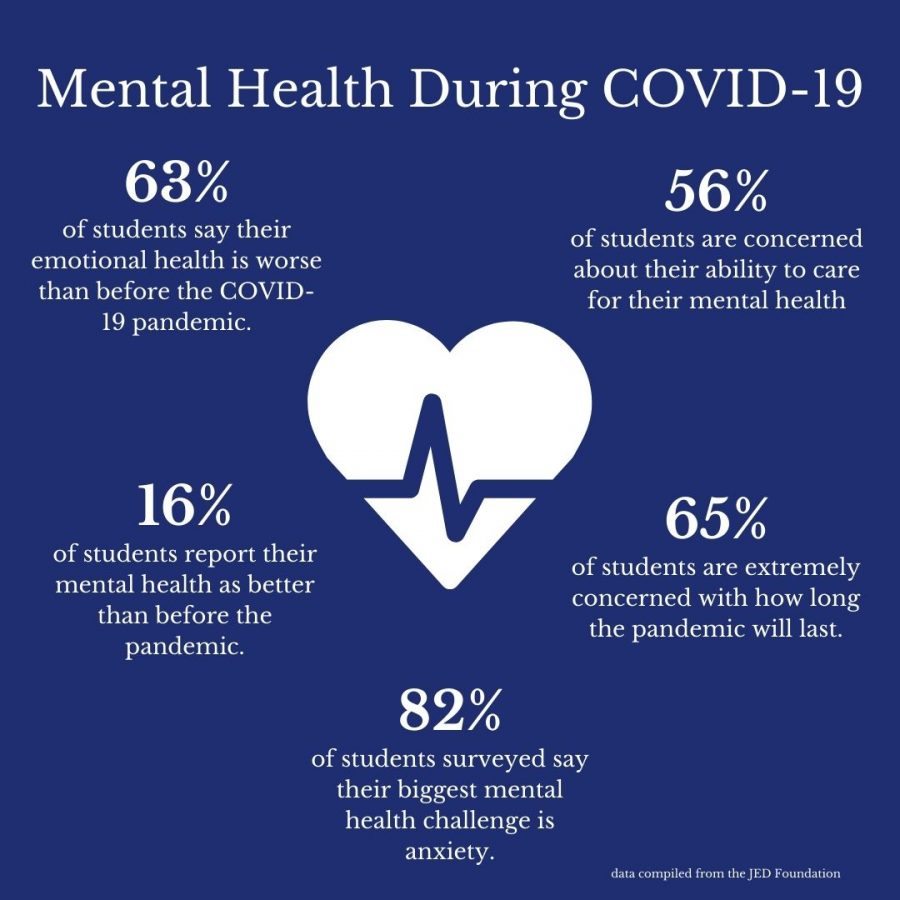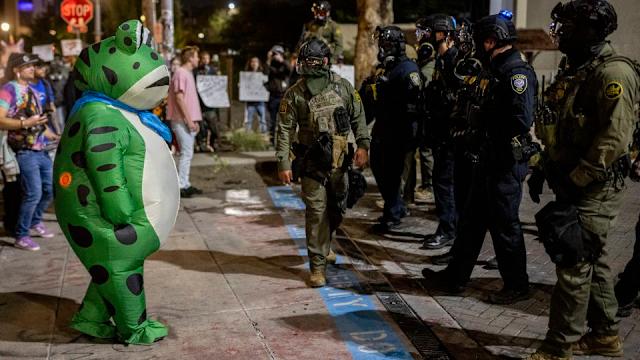Gannon faculty bring mental health training to campus
Program prepares faculty to handle mental health crises among college students
Mental health issues are hard to deal with for students without a global pandemic. With COVID-19, students are facing these issues at a higher rate than under normal circumstances. Awareness and aid are crucial during this time, which is why Jill Merritt, Ph.D., and Renee Foradori are offering the Youth Mental Health First Aid Program for faculty and staff at Gannon.
February 2, 2021
Gannon University faculty members Jill Merritt, Ph.D., and Renee Foradori are offering the Youth Mental Health First Aid Program for faculty and staff. The program is aimed at identifying mental health concerns in 12-25-year-olds.
The program is a two-part course — the first being an online, self-paced course focused on the difference between normal teenage behavior and the behavior of teenagers suffering from mental health issues. The second part focuses on detecting signs of mental health disorders and suicidal behavior, as well as how to approach students and get them the help they need.
“We really talk about what’s different from the typical things we see in a teenager,” Foradori, an assistant professor in Gannon’s biology department, said. “You always hear, ‘Oh that’s just a teenage thing.’ No, it is not just a teenage thing. It’s an issue.”
According to Merritt, an associate professor in Gannon’s School of Education, this training is just as important as physical first aid training.
“There are a lot of people who are first aid trained and know what to do if someone is having a heart attack,” Merritt said. “This is intended for people to recognize warning signs during mental health crises, and to be able to refer.”
Foradori agrees that mental health is just as important as physical health.
“Right now, we are so focused on physical health. It’s all about COVID-19,” Foradori said. “They did something like 2,000 COVID-19 tests in a week trying to get everyone back on campus. If we could have 2,000 conversations to see how someone really is doing, wouldn’t that be phenomenal?”
The two focuses of the course are recognition and destigmatization. The course is designed to bring more awareness to and ignite a conversation about mental illness.
The more people talk about it, the more normalized it will become. Consequently, more people will feel comfortable seeking help.
“There is shame and fear that comes along with the idea of medication or talking to a therapist for some people,” Merritt said. “Everyone probably knows someone, whether they realize it or not, who is struggling with their mental health.”
Talking about mental health is the first step to making students and staff alike feel more comfortable to seek help. This training aids in that, as it opens the conversation to what steps are needed to ensure positive mental health.
“People need to recognize that it’s good to talk about it,” Foradori said. “The more we talk about it and put it in your face, the more we recognize that this is out there and we need to do something about it.”
Recognition is another critical aspect of mental health training. These courses focus largely on implementing a plan of action when a staff member sees that a student is struggling.
“We talk about an action plan and how to approach a student when you’ve done the observations,” Foradori said.
When faculty and staff are trained in how to recognize instances and signs of poor mental health, they are better able to get students the help they need.
“My goal getting into this was for teachers to be able to recognize when their students are having some sort of mental health crises, as opposed to just looking at them as someone who might be having bad behavior,” Merritt said.
‘Especially in the public school setting, we are going to be seeing a lot more students with depression and anxiety, so as teachers, we need to be more prepared for that.”
Justin Johnson, a senior theology and social work major and member resident assistant at North Hall, agrees that being able to recognize when students are having difficulty is necessary.
“It is important for faculty to know the signs and behaviors of someone struggling with their mental health in order to get them the care they need,” Johnson said. “Faculty will be better equipped to respond to situations where the mental health of a student is declining.”
If staff are not properly trained to recognize signs of declining mental health, it could be mistaken for something else.
“Sometimes we see students who just stop coming to class and we just assume that they aren’t interested, when really that could be something mental health-related,” Merritt said.
Johnson believes that mental health training in any capacity would allow for more compassion for students and less misunderstanding.
“If professors have not experienced mental illness or are not educated in this area, it would be easier to perceive some student behaviors as lazy or lackadaisical,” Johnson said. “In reality, these students need support, not stigma.”
The COVID-19 pandemic has created even more of a need for mental health training and services.
“This whole pandemic is a mess,” Foradori said. “This last year, it feels more and more important because we have so many people that are diagnosed with mental health disorders.”
It is important for students and faculty alike to be gracious toward each other during this time. Because of the pandemic, humans are deprived of social interaction, which they so desperately need. People are also bombarded with information, and this influx can be harmful to mental health.
“Social distancing, misinformation and hysteria are really detrimental,” Johnson said. “Maslow’s hierarchy of needs tells us that if people do not feel safe, they will not be able to accomplish much else until they have a sense of security.”
Recognition and de-stigmatization are the first steps. However, after these measures are taken, it is imperative that mental health services are accessible and readily available to get students the help they need.
As the need for mental health services increases, the availability of services should also increase.
“The more we learn about mental health, the more students we are going to see that need some kind of support,” Merritt said. “Nobody is really prepared for that.”
Foradori agreed, saying that recognition is only one piece to complete treatment.
“We have to have the backup,” Foradori said. “I can recognize that something is going on with a student, but if I can’t move that student to the next step, we can’t diagnose, cure or do therapy.”
According to Johnson, awareness is important, but help and treatment should follow.
“We talk about well-being as holistic but have limited interventions when students are struggling,” Johnson said. “We cannot force students to go to therapy, but we can do more than send them a few emails. If we can have a meeting for students about policy violations then we absolutely can have conversations about their well-being.”
For example, at Gannon, three available counselors are expected to care for hundreds of students. While these counselors are diligent, the need for mental health professionals on campus is more than should be expected of them.
“The therapists at the counseling center are phenomenal,” Johnson said. “However, the demand for wellness and therapy is more than what those three individual staff members can and should have to bear.”
Johnson also stresses the importance of prioritizing the mental health of student leaders.
“In my three years as an RA, I have seen students drink in excess due to a lack of mental and emotional well-being,” Johnson said. “I have had students show me cuts on their wrists from trying to kill themselves. I have gone to bed at night worried that a resident would not survive until morning. Sometimes I document these experiences, and nobody reaches out to see how I am doing.”
The mental health of faculty and staff should also be prioritized, according to Foradori.
“If a faculty member goes through an event with a student, that’s traumatic for the faculty member as well,” Foradori said. “When you’re with your students so much, they become your family.”
According to Johnson, mental health training for faculty is an excellent first step. This education should also be made available to students as part of their orientation at Gannon.
“I think we need to talk more about lived experiences of people dealing with mental illness and even losing someone to suicide,” Johnson said. “If we cannot engage in conversations about it that will continue to fuel the fires of isolation and stigma.”
According to Merritt, mental health awareness and education should be an ongoing pursuit.
“We could all get better at addressing the mental health needs of our college students,” Merritt said.
If you or someone you know is dealing with mental health issues, reach out to Gannon’s Counseling Center at 814-871-7622.








Harold A Maio • Feb 3, 2021 at 1:53 pm
Do you think the day will come when we stop teaching one another there is a stigma to mental health issues?
Do you think the day will come when we righteously object to the lesson? When we will say enough is enough, stop?
That time has come for me.
Harold A Maio